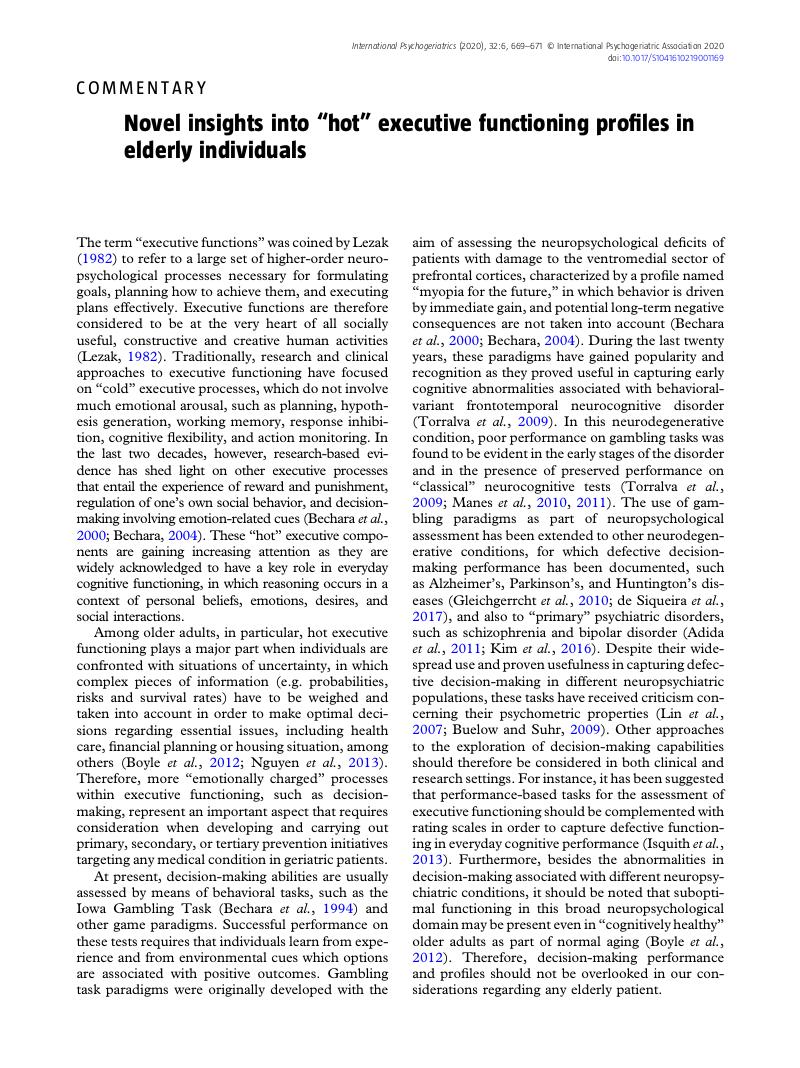No CrossRef data available.
Article contents
Novel insights into “hot” executive functioning profiles in elderly individuals
Published online by Cambridge University Press: 03 July 2020
Abstract
An abstract is not available for this content so a preview has been provided. Please use the Get access link above for information on how to access this content.

- Type
- Commentary
- Information
- International Psychogeriatrics , Volume 32 , Issue 6: Issue Theme: Interaction of Depression and Cognition in Older Age , June 2020 , pp. 669 - 671
- Copyright
- © International Psychogeriatric Association 2020
References
Adida, M.et al. (2011). Trait-related decision-making impair-ment in the three phases of bipolar disorder. Biological Psychiatry, 70, 357–365. doi: 10.1016/j.biopsych.2011.01.018.CrossRefGoogle Scholar
Bechara, A. (2004). The role of emotion in decision-making: evidence from neurological patients with orbitofrontal damage. Brain and Cognition, 55, 30–40. doi: 10.1016/j.bandc.2003.04.001.CrossRefGoogle ScholarPubMed
Bechara, A., Damasio, A. R., Damasio, H. and Anderson, S. W. (1994).
Insensitivity to future consequences following damage to human prefrontal cortex. Cognition, 50, 7–15. doi: 10.1016/0010-0277(94)90018-3.CrossRefGoogle ScholarPubMed
Bechara, A., Damasio, H. and Damasio, A. R. (2000) Emotion, decision making and the orbitofrontal cortex.
Cerebral Cortex, 10, 295–307. doi: 10.1093/cercor/10.3.295.CrossRefGoogle ScholarPubMed
Biella, M.et al. (2019). Decision-making profile in older adults: the influence of cognitive impairment, premorbid intelligence and depressive symptoms. International Psychogeriatrics, 32, 697–703. doi: 10.1017/S1041610219001029.CrossRefGoogle ScholarPubMed
Boyle, P. A., Yu, L., Wilson, R. S., Gamble, K., Buchman, A. S. and Bennett, D. A. (2012). Poor decision making is a consequence of Cognitive Decline elderly without Alzheimer’s disease or mild cognitive impairment. PLoS One, 7, e43647. doi: 10.1371/journal.pone.0043647.CrossRefGoogle ScholarPubMed
Buelow, M. T. and Suhr, J. A. (2009). Construct validity of the Iowa Gambling Task. Neuropsychology Review, 19,
102–114. doi: 10.1007/s11065-009-9083-4.CrossRefGoogle ScholarPubMed
de Siqueira, A. S., Yokomizo, J. E., Jacob, W. F., Yassuda, M. S. and Aprahamian, I. (2017). Review of decision-making in game tasks in elderly participants with Alzheimer disease and mild cognitive impairment. Dementia Geriatric Cognition Disorder, 43, 81–88. doi: 10.1159/000455120.CrossRefGoogle ScholarPubMed
Gleichgerrcht, E., Ibáñez, A., Roca, M., Torralva, T. and Manes, F. (2010). Decision-making cognition in neurodegenerative diseases. Nature Reviews Neurology, 6, 611–623. doi: 10.1038/nrneurol.2010.148.CrossRefGoogle ScholarPubMed
Isquith, P. K., Roth, R. M. and Gioia, G. (2013) Contribution of rating scales to the assessment of executive functions. Applied Neuropsychology: Child, 2, 125–132. doi: 10.1080/21622965.2013.748389.CrossRefGoogle ScholarPubMed
Kim, M. S., Kang, B. N. and Lim, J. Y. (2016). Decision making deficits in patients with chronic schizophrenia: Iowa Gambling Task and Prospect Valence Learning model. Neuropsychiatric Disease and Treatment, 12, 1019–1027. doi: 10.2147/NDT.S103821.CrossRefGoogle ScholarPubMed
Lezak, M. (1982). The problem of assessing executive functions. International Journal of Psychology, 17, 281–297. doi: 10.1080/00207598208247445.CrossRefGoogle Scholar
Lin, C. H., Chiu, Y. C., Lee, P. L. and Hsieh, J. C. (2007). Is deck B a disadvantageous deck in the Iowa Gambling Task? Behavioral and Brain Functions, 3, 16. doi: 10.1186/1744-9081-3-16.CrossRefGoogle Scholar
Manes, F., Torralva, T., Ibáñez, A., Roca, M., Bekinschtein, T. and Gleichgerrcht, E. (2011). Decision-making in frontotemporal dementia: clinical, theoretical and legal implications. Dementia and Geriatric Cognitive Disorders, 32, 11–17. doi: 10.1159/000329912.CrossRefGoogle ScholarPubMed
Manes, F., Torralva, T., Roca, M., Gleichgerrcht, E., Bekinschtein, T. and Hodges, J. R. (2010). Frontotemporal dementia presenting as pathological gambling. Nature Reviews Neurology, 6, 347–352. doi: 10.1038/nrneurol.2010.34.CrossRefGoogle ScholarPubMed
Mann, L., Burnett, P., Radford, M. and Ford, S. (1997). The Melbourne Decision Making Questionnaire: an instrument for measuring patterns for coping with decisional conflict. Journal of Behavioral Decision Making, 10, 1–19. doi: 10.1002/(SICI)1099-0771(199703)10:1<1:AID-BDM242>3.0.CO;2-X.3.0.CO;2-X>CrossRefGoogle Scholar
Nguyen, C. M., Barrash, J., Koenigs, A. L., Bechara, A., Tranel, D. and Denburg, N. L. (2013). Deficits in decision-making in normal elderly associated with disorders of executive personality. International Psychogeriatrics, 25, 1811–1819. doi: 10.1017/S1041610213001270.CrossRefGoogle ScholarPubMed
Torralva, T., Roca, M., Gleichgerrcht, E., Bekinschtein, T. and Manes, F. (2009). A neuropsychological battery to detect specific executive and social cognitive impairments in early frontotemporal dementia. Brain, 132, 1299–1309. doi: 10.1093/brain/awp041.CrossRefGoogle ScholarPubMed




